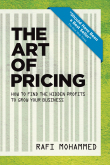The Real Reason Netflix Stock Tanked
Reprinted from the Harvard Business Review website.
As a pricing strategy consultant, the first question I ask my clients is "what do you want to accomplish out of your new strategy?" Everyone wants to make higher profits, of course, but it's the constraints that I listen for. Some also want to increase operating margins while others also want to grow volume. Not asking and answering this simple question has led to the downfall of Netflix.
No doubt, Netflix's execution of its price hike was bungled. However, its intent made sense. The company is heavily investing in streaming media - the future of entertainment content delivery—and needed to charge customers more. If you add caviar and filet mignon to a Sunday brunch buffet, you have to increase prices, right? Netflix simply opted to raise prices by 20 - 60%.
Here's how I would have handled this pricing challenge: have an open conversation with customers about the situation. Tell them that acquiring additional streaming content is very costly. Continue to offer them the same content for the same price. However, if subscribers want additional new content, ask them to upgrade to a more expensive silver or gold package. Customers don't take well to "take it or leave it" ultimatums. Instead, they appreciate choices, and this "good, better, best" strategy intuitively justifies higher prices.
Blunders aside, Netflix's rudimentary price hike is likely to be profitable. Whenever prices are raised, there's a good chance that volume will decrease, too. Primarily because of its price hike, Netflix announced yesterday that it lost 800,000 customers (3% of its subscriber base) in the last quarter, but the company believes the hemorrhaging had subsided. That's a lot of customers to lose, but it's important to remember that 23.8 million customers remained loyal. And while some may have downgraded their subscription package, many accepted the higher prices. Losing 3% of your customer base in return for the remaining 97% agreeing to pay 20 - 60% more for the same service seems like a profitable decision.
So if this price hike will be profitable, why has Netflix's stock price cratered from $291 to $75 since its July 13th price increase announcement? Because Wall Street is demanding profits as well as volume growth. Six months ago, Netflix had a P/E ratio of 78.6. With such a high P/E ratio, Wall Street is in essence saying "profits are good, but we expect strong growth." The fact that Netflix's subscriber growth has come to an abrupt halt is what's spooking Wall Street, despite the increased profit potential. Mature companies can't command such a grandiose P/E ratio. This was all forseeable, and Netflix should have balanced its need to charge more to offset its higher costs with the need to show continued subscriber growth to keep shareholders happy.
The Netflix fiasco shows the risks of a badly-planned price hike. It's irrevocably damaged a great company and put its existence at risk in the digital media delivery market. The lesson that Netflix (and its investors) learned is that pricing is far more than a two-trick "raise or lower" strategy, and that taking pricing decisions so lightly can have serious consequences.
So what do you think? Will Netflix make more money from its 23.8 million subscriber base? Will it be able to recover from this snafu? Or is it toast?




